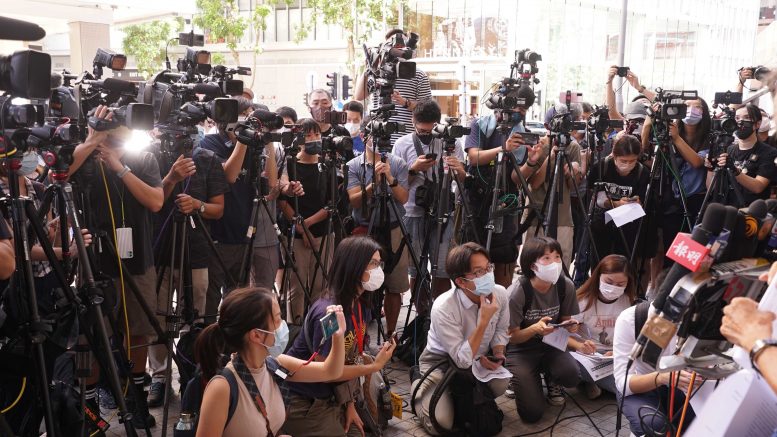By Chris Yeung —
Hong Kong greeted the World Press Freedom Day on May 3 with a piece of good news – and a bad one. The good news is that the city’s latest press freedom ranking in a global survey rose eight positions from last year’s 148th. The bad news is that it stayed at 140th among the 180 regions surveyed by the Reporters Without Border (RSF). China ranked 179th, just above North Korea.
Cédric Alviani, East Asia bureau director of RSF, said that the slight change in the city’s ranking in the index should not be seen as an improvement, but instead due to the ranking movement of other countries and the index adjustment. He could not be more right.
With no marked improvement of the environment for a free press in the past 12 months, there were indeed a couple of disturbing cases of fresh concerns for journalists as RSF’s Alviani has pointed out in an media interview.
He said: “In the past month – and week – we also have observed cases of media outlets being barred from reporting on official events, while a few journalists including from independent online media outlets have been followed.”
He was referring to reports of complaints by journalists that they had been barred from covering a major symposium on national security attended by Beijing’s official in charge of Hong Kong affairs, Xia Baolong, on April 15. Another case involved a few journalists, including one from Hong Kong Free Press, who complained of being followed after covering a court hearing.
Like the latest press freedom ranking, the two cases of suspected curbs on journalists plus an all-too-familiar government rebuttal had been treated coolly by media outlets. It hardly came as a surprise. The story of press freedom in Hong Kong in decline is yesterday’s news.
To cynics and doomsayers, press freedom in the city no longer matters. They could not be more wrong.
Admittedly, every free city faces a dilemma of how to strike a balance between civil liberties and social order. Hong Kong had managed to find a largely right balance in the past, which was one of the key factors behind the city’s success. That again is history.
The gradual shift of emphasis by government officials on such political imperatives as upholding national security and social stability and social responsibility vis-a-vis press freedom has been markedly clear.
Though still dubbed as the fourth power with a watchdog role by top officials in the previous administration led by Carrie Lam, the reference to the media’s role as watchdog has notably been absent from the vocabulary of officials in the John Lee government when it came to the issue of journalism.
A case in point is a string of remarks given by Deputy Financial Secretary Michael Wong at a news award presentation ceremony held at the Hang Seng University of Hong Kong.
Wong, whose portfolio included head of the Information Services Department, went into length on the prospect of journalists. He raised some eyebrows when he said journalists could enjoy middle class-level standard of living, like those principal officials, although they would not be able to make big money.
Wong specifically said business journalists, who could gain first-hand knowledge and build up a strong network through their job, would be in a strong position to do well in other fields.
What Wong said about the “middle-class” living of journalists is too good to be true; it has emerged as a subject of ridicule among netizens. A good laugh, but no harm.
What he did not say, however, is perhaps more a cause for worry on the future of journalism in the city.
A news award presentation ceremony hosted by a university’s journalism department could not be a better occasion for officials to reaffirm press freedom as guaranteed in the Basic Law and the role of the media as the fourth power in Hong Kong.
The fact Wong has sought to highlight what he saw as a decent living journalists but apparently stayed clear of the sensitive zone of press freedom and the watchdog role of media did not augur well for the future of an independent, free media in the city.
In the aftermath of a string of media closures starting with Apple Daily in mid-2021, followed by three online outlets, namely the Stand News and the Citizen News and FactWire, independent media has disintegrated. The mood of journalists hit a new low.
Although there have been no more arrests of journalists in the past 12 months, the trial of the Stand News case and the pre-trial battle of the hiring of UK barrister Tim Owen as Jimmy Lai’s defence counsel have emerged as bad news, further dampening hopes for press freedom.
The only piece of good news is the self-made story by Hong Kong journalists, whether they have stayed or have migrated, about their faith in the value of journalism and the power of independent press in telling readers the right from the wrong.
ends


Be the first to comment on "Good news, bad news of HK media"